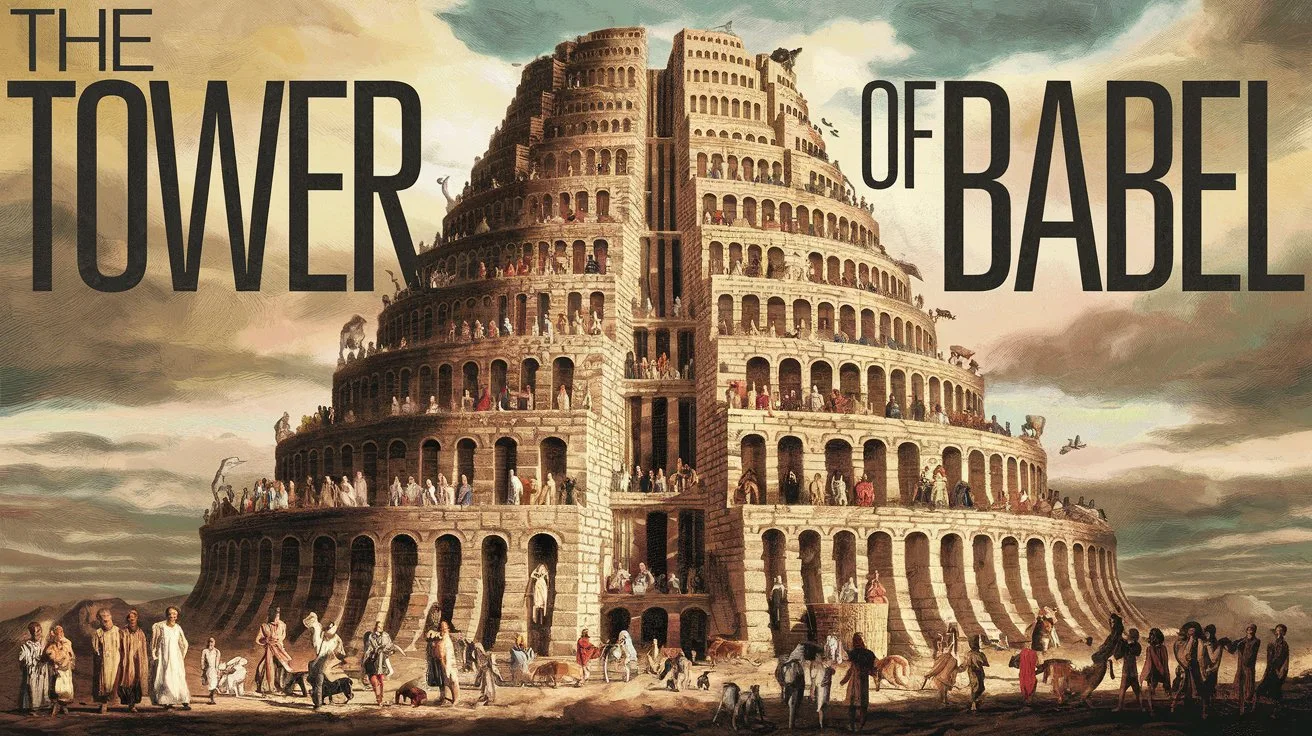The account of the Tower of Babel is recorded in Genesis 11:1-9, and it stands as a defining moment in history when humanity, in defiance of God’s command, sought to build a kingdom of its own. In this study, we will examine the meaning of Babel, its leader Nimrod, and why God scattered the people by confusing their languages.
The Meaning of Babel
The word Babel (בָּבֶל, Bāḇel) is significant. In Genesis 11:9, the Scripture states:
“Therefore its name is called Babel, because there the Lord confused the language of all the earth; and from there the Lord scattered them abroad over the face of all the earth.”
The name means confusion in Hebrew, but in Babylonian culture, it was seen as Bab-Ilu, meaning “Gate of God.” This contrast is key: while humanity saw their efforts as an ascent to the heavens, God saw it as rebellion that resulted in disorder.
Babel represents mankind’s pride and rejection of God’s authority. This theme echoes throughout Scripture, culminating in Revelation 17-18, where “Mystery Babylon” is described as the final system of rebellion against God.
Who Commissioned the Tower of Babel?
Though the Bible does not directly say who ordered the tower to be built, the leader of this movement was Nimrod, a grandson of Ham, the son of Noah.
Genesis 10:8-10 tells us:
“Cush begot Nimrod; he began to be a mighty one on the earth. He was a mighty hunter before the Lord; therefore, it is said, ‘Like Nimrod the mighty hunter before the Lord.’ And the beginning of his kingdom was Babel, Erech, Accad, and Calneh, in the land of Shinar.”
Nimrod is the first recorded king in the Bible, and the phrase “mighty one” (gibbor) often denotes a warrior or a ruler. The phrase “before the Lord” does not mean that he was righteous, but rather that he was a powerful figure in defiance of God. This is reinforced by the fact that he was the founder of Babel, a city built in opposition to God’s command to spread across the earth (Genesis 9:1). The construction of the tower was not simply an act of architecture, but a declaration of independence from God.
Genesis 11:4 records their intentions:
“And they said, ‘Come, let us build ourselves a city, and a tower whose top is in the heavens; let us make a name for ourselves, lest we be scattered abroad over the face of the whole earth.’”
Rather than glorifying God’s name, they sought to glorify their own. Rather than obeying God’s command to fill the earth, they sought to remain united in their rebellion.
Was Nimrod a Nephilim?
The Nephilim were mentioned in Genesis 6:4, described as “mighty men of old, men of renown.” Some suggest that Nimrod, being called a gibbor (mighty one), might be linked to them. However, there is no explicit biblical evidence that Nimrod was a Nephilim or had any supernatural lineage.
The key takeaway is that Nimrod, whether Nephilim or not, was a tyrant who led the first great rebellion against God after the flood. His kingdom was the first recorded human empire—built on power, pride, and defiance.
Why Did God Disperse the People and Confuse the Languages?
God had commanded mankind to multiply and fill the earth:
Genesis 9:1 “So God blessed Noah and his sons, and said to them: ‘Be fruitful and multiply, and fill the earth.’”
But instead of obeying, humanity united in opposition. The Lord took notice of their intentions:
Genesis 11:6 “And the Lord said, ‘Indeed the people are one and they all have one language, and this is what they begin to do; now nothing that they propose to do will be withheld from them.’”
This does not mean that God was threatened by human progress, but rather that unchecked rebellion would lead to even greater sin. As in the days before the flood, humanity had once again turned toward wickedness. So, God acted:
Genesis 11:7-8 “Come, let Us go down and there confuse their language, that they may not understand one another’s speech.” So the Lord scattered them abroad from there over the face of all the earth, and they ceased building the city.”
This divine intervention was both judgment and mercy. It halted humanity’s rebellion before it could escalate further and ensured that God’s command to spread across the earth was fulfilled.
The Spiritual Significance of Babel
The Tower of Babel is not just an ancient story; it is a warning against pride and self-sufficiency apart from God. Babel was the birthplace of human-centered religion, false unity, and defiance against the Most High. This theme continues throughout Scripture.
Isaiah 14:12-15 speaks of Lucifer’s fall and his desire to “ascend above the heights of the clouds”—the same spirit that drove the people at Babel.
Revelation 18:2 describes the final judgment of Babylon, calling it “the habitation of demons.”
Acts 2:4-11 presents the reversal of Babel, when at Pentecost the Holy Spirit enabled people to understand the Gospel in various languages, uniting them in Christ rather than scattering them in judgment.
Where Babel brought confusion, the Gospel brings clarity. Where Babel divided, Christ unites. The only true kingdom that will stand is the one established by Jesus.
My Final Thoughts
The Tower of Babel stands as a timeless warning against the dangers of human pride and rebellion. Nimrod and his people sought to make a name for themselves, but in the end, their efforts were scattered to the winds. No kingdom built in defiance of God will ever stand.
But the Gospel calls us to something greater. Jesus is the true King, and His kingdom is not built on human ambition, but on the unshakable foundation of His righteousness. If we examine our own lives, we must ask: Are we building our own towers of Babel (seeking to glorify ourselves, striving for success apart from God, relying on our own strength)? Or are we submitting to the Lord, trusting in His wisdom, and following His commands? The choice remains the same today as it was in Babel. Either we build in obedience to God, or we labor in vain.





 Get the book that teaches you how to evangelize and disarm doctrines from every single major cult group today.
Get the book that teaches you how to evangelize and disarm doctrines from every single major cult group today.